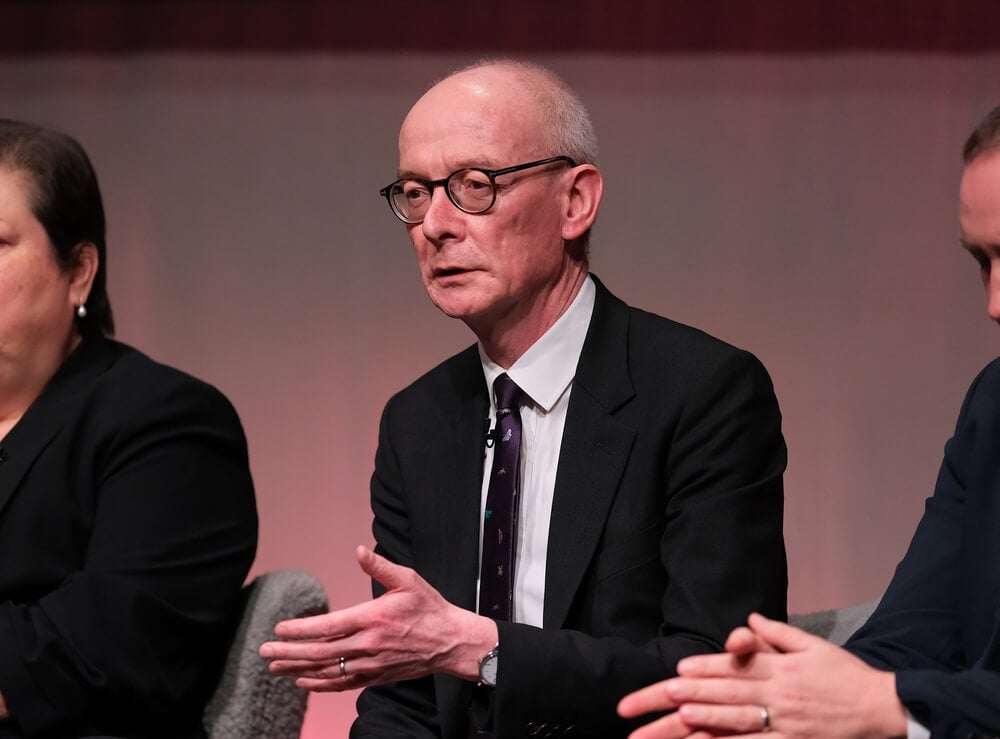The UK government this week took the lead in urging its allies to prepare for an escalating cyber war with Russia in which Moscow planned to weaponise artificial intelligence in a campaign to destabilise them.
Announcing the creation of a UK-based AI Security Research laboratory to a NATO gathering in London, senior minister Pat McFadden said: “While no one should underestimate the Russian aggressive and reckless cyber threat to NATO, we will not be intimidated by it and we will never allow it to dictate our decisions or policies.”
McFadden, whose cabinet role includes the national security brief, linked his warning about Russia’s existing cyber warfare campaign and the future AI threat to the current situation in Ukraine.
He said President Vladimir Putin was using threats to try to deter allied support for Ukraine, adding: “We will not join those voices of weakness who want to give Putin a veto over our help for Ukraine.”
Who was the minister addressing beyond the allied cyber and security officials gathered in London to hear his heavily trailed speech?
He clearly intended Moscow to pay attention, saying the UK and its allies knew exactly what the Russians were doing and were countering their attacks both publicly and behind the scenes.
His remarks can also be read as a note of caution to the incoming Trump administration in Washington that any settlement imposed on Ukraine through a lessening of allied support would not mean an end to Moscow’s strategy of confrontation with the West. He noted that Russia’s cyber warfare campaign long predated its invasion of Ukraine.
Rising tensions between London and Moscow
McFadden’s speech came amid rising tensions between London and Moscow over Ukraine’s first use of British-supplied long-range Storm Shadow missiles against targets inside Russia. The outgoing Biden administration has also, in its dying days, removed US restrictions on Ukraine’s use of similar long-range weapons.
The UK government has not formally acknowledged it authorised such use of the Storm Shadow, which the Russian ambassador to London, Andrei Kelin, said meant Britain was now ‘directly involved’ in the Ukraine war.
President Putin went further, indirectly threatening to strike the UK with a new ballistic missile Russia has already used to target Ukraine. He warned that Moscow was entitled to use its weapons against the military facilities of those countries that allowed their weapons to be used against similar Russian targets.
The UK’s intensified hard line towards Russia may have less to do with events on the frontline in Ukraine than with preparing for the day after
Prime Minister Keir Starmer told the UK Parliament that the country would not be deterred or distracted by such reckless threats and that all assistance to Kyiv was in accordance with international law and always for its self-defence.
The UK’s intensified hard line towards Russia may have less to do with events on the frontline in Ukraine than with preparing for the day after, should Donald Trump fulfil his ambition to achieve a speedy negotiated end to the war.
A settlement that left Russia in possession of Ukrainian territory would be interpreted by Putin as at least a partial victory. It might embolden him to step up an existing hybrid campaign against the rest of Europe aimed at undermining the NATO alliance.
GRU’s mission on British and European streets
Last month, the head of Britain’s MI5 domestic intelligence agency, Ken McCallum, claimed Russian GRU military intelligence was on a mission to generate mayhem on British and European streets.
It was the same MI5 that was criticised in a delayed 2020 parliamentary report for failing to anticipate or investigate possible Russian interference in the 2016 referendum that led to Britain’s departure from the European Union, something of a strategic bonus for the Kremlin.
Since the Ukraine invasion the security establishment has been more vigilant towards the Russian threat
Since the Ukraine invasion the security establishment has certainly been more vigilant towards the Russian threat, expelling the last of Moscow’s spies, sanctioning Kremlin allies and sounding the alarm over Russia’s use of freelance online warriors to sew conspiracy theories and generate domestic unrest.
Aside from Russia’s botched attempt to murder its exiled former spy Sergei Skripal on British soil in 2018, Moscow is also held responsible for using criminal networks to carry out arson and cyber attacks on British targets.
The daily targets of Moscow’s cyber war
Last month a British man admitted to breaking the newly strengthened National Security Act by carrying out an arson attack on a Ukrainian-owned warehouse in London on behalf of Russia.
Minister McFadden said the daily targets of Moscow’s cyber war on the UK included the media, telecoms, political institutions and energy infrastructure.
 The daily targets of Moscow’s cyber war on the UK included the media, telecoms, political institutions and energy infrastructure - Pat McFadden
The daily targets of Moscow’s cyber war on the UK included the media, telecoms, political institutions and energy infrastructure - Pat McFadden
His message, addressed most importantly perhaps to the British public, was that such incidents could be just the tip of the iceberg in a campaign that, with the help of AI, could inflict real damage by literally turning off the lights for millions of people.
The challenge for the Starmer government is that an increasingly belligerent tone towards Russia might not echo with a public which, while it has shown solid support for the Ukrainian cause, is also adjusting to the prospect of a Trump-imposed settlement.
While many might agree with Starmer’s principle of standing up to bullies, the Kremlin’s online bot armies will no doubt be inflating the views of others who argue against recklessly prodding the Russian bear.